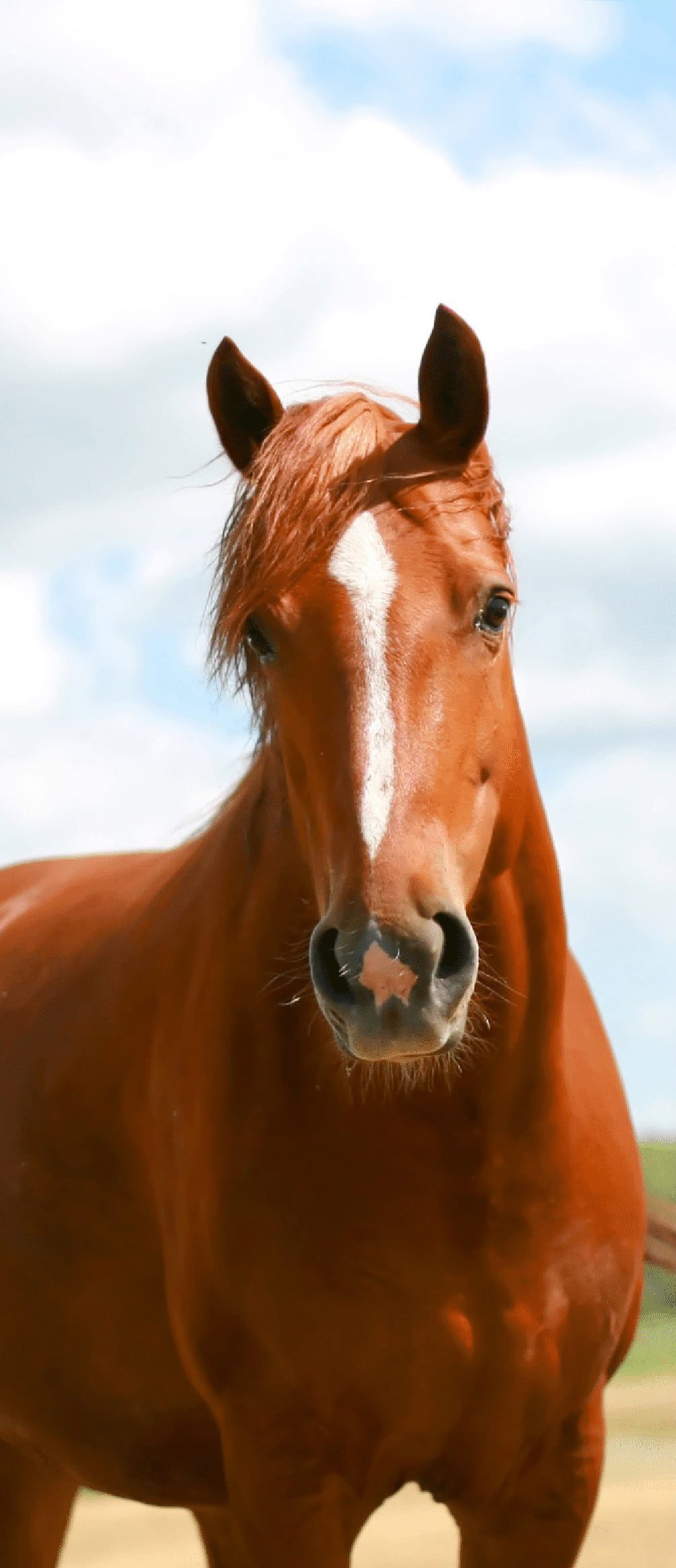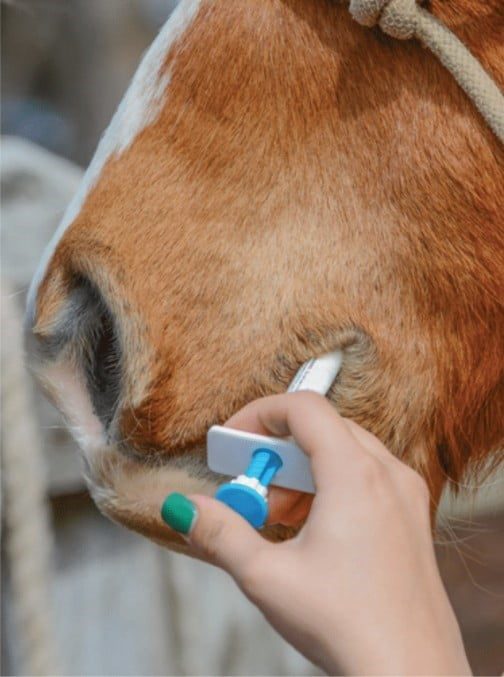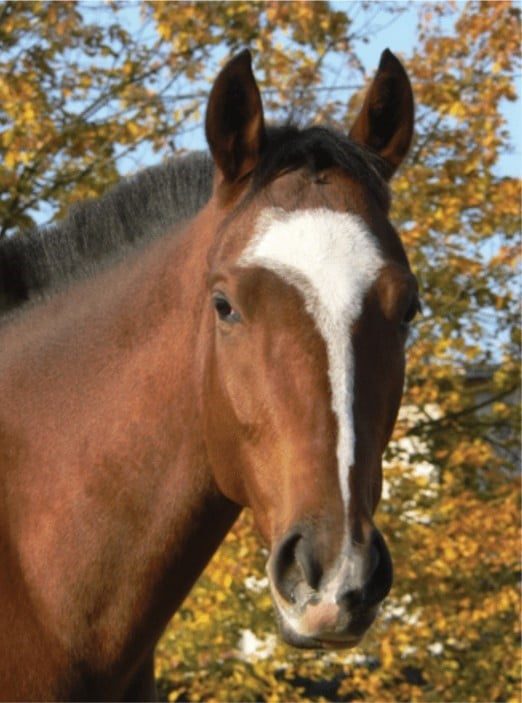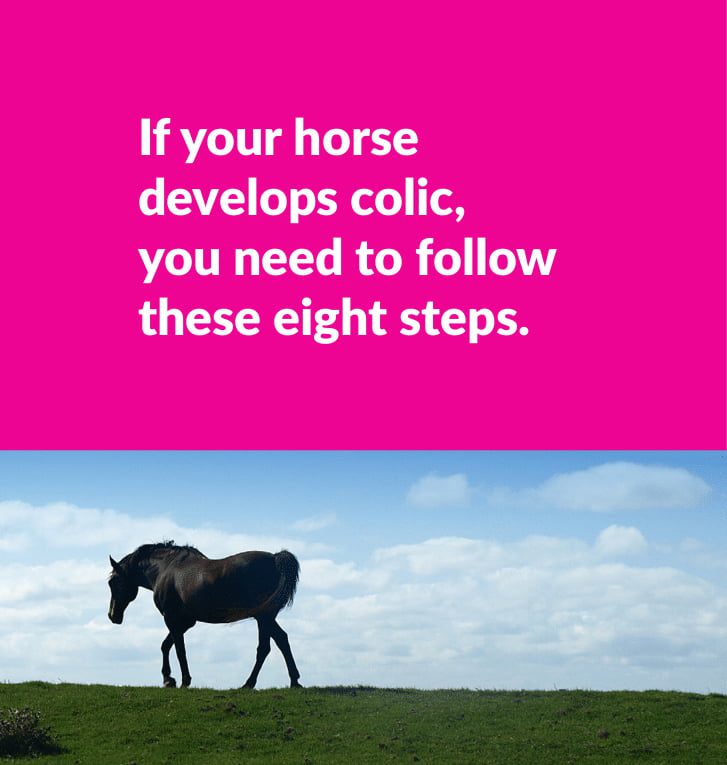
We, as equine vets, see colic very often. It would be one of the most common emergencies we go to after hours. The most common causes of colic we see are due to changes in feed and poor denta l care.
COLIC
How to prevent it, what to do if you can't prevent it and when to call your vet.
Colic is the most concerning problem your horse may ever suffer from. A lot of other diseases or injuries may never happen to your horse but, chances are, you will have at least one bout of colic throughout your years of owning horses. It may only be a mild, transient case or a medical emergency requiring surgery. In this article, we explain what you can:
- Do to prevent colic ever occurring
- Do yourself when your horse has colic
- Look for and when to call your vet
The first thing to understand is the syndrome of colic describes a large number of different gastrointestinal upsets that cause abdominal pain. It can be primary colic, due to a number
of precursors, or it can be secondary to disease or stress.
We, as equine vets, see colic very often. It would be one of the most common emergencies we go to after hours.
The most common causes of colic we see are due to changes in feed and poor dental care. These two causes often present themselves at feed time and some horses that are fed in the morning are okay at the first feed, but then show signs at dinner time, or vice versa. If you change feed in the night,you may get up in the morning and find your horse has been rolling.
To prevent colic from ever occurring you need to follow these eight steps.
If changing feed type, do it gradually over one to two weeks. Don’t allow yourself to run out of feed either. Stopping a feed for several days and starting your horse again is often enough to interrupt the bacteria in the caecum.
The horse has a complex digestive system with a fermentation vat called the caecum. It’s filled with bacteria that break down the food to digestible material, so the horse can absorb the nutrients.
However, the by-product of this process is gas.
Usually, a normal diet of pasture creates only small amounts of gas. But, when you change the diet to foods that require more energy to break them down, more gas is created. Changing the diet gradually allows the bacteria in the caecum to accustom to working harder and releasing less gas in the process.
When travelling it is always safest to take your feed, including hay, with you. Another common change in feed occurs when moving horses to a fresh paddock with more or short, sweet grass.
When changing wormers, it’s very important to look at the acfive ingredients, not just the name of the wormer.
2
ENSURE YOUR HORSE RECEIVES PROPER DENTAL CARE, AT LEASTANNUALLY.
Keep your horses teeth filed regularly. A check-up by a qualified equine dental veterinarian is crucial at least once a year to keep your horse’s teeth in a healthy condition and able to chew properly.
Without proper dental care, your horse is unable to grind its food into small enough particles for the bacteria to digest easily. This can lead to two problems.
- Firstly, the bacteria work harder so they create more gas, which leads to stomach
- Secondly, if your horse is swallowing food that is not digested properly, then it can form a bolus of food that can become wedged or stuck. This is called an impaction.
3
PROVIDE FRESH WATER TO YOUR HORSEATALL TIMES, INCLUDING AT SHOWS.
Ensure your horse has access to fresh water throughout the day and night. This is especially important for competition horses and on hot days.
If your horse doesn’t have access to enough water, they absorb more from the intestinal contents, which can cause the faeces to dry out and form a blockage, which is another form of impaction.
Some horses can be really fussy if they are away from their normal water source. The best way to camouflage the taste or smell they don’t like is by adding some electrolytes or molasses to the water.
The other thing to consider is where your water is stored. In the heat of Summer, if your horse’s water source is in direct sunlight for most of the day, it can heat up to 40 degrees. Move water to shaded areas. Under a manmade shelter is ideal, as water troughs under trees create unnecessary risk in areas affected by Hendra Virus.
4
ENSURE YOUR HORSE RECEIVES EFFECTIVE WORMING REGULARLY.
Keep your horse up to date with worming.
There are two issues with worming. The first is underestimating your horse’s weight and, therefore, under-dosing. The second is using the same wormers and creating drug-resistant worms.
When changing wormers, it’s very important to look at the active ingredients, not just the name of the wormer. Ivermectin or other ’mectins’ oxfendazole or other’azoIes’, pyrantel and moxidectin are all different active ingredients.
Worms can cause damage to the stomach and intestinal lining, and prevent absorption of nutrients. Others can cause diarrhoea and colic.
The most common problem with colic caused by a worm burden is when you use a new wormer. If you kill a mass of worms at once, these can then cause another form of impaction.

When changing wormers, it’s very important to look at the acfive ingredients, not just the name of the warmer.
5
REMOVE ALL HAZARDS FROM PADDOCKS, STALLS, STABLES AND YARDS.
Ensure your horse is safe from potential hazards by clearing common items, like baling twine and covers, including from round hay bales.
I can personally recall several instances of colic caused by baling twine. Each horse had ingested baling twine, along with feed material, and together they caused an impaction. I can also remember one particular horse who had decided to eat a blue tarp!
Keeping your paddocks, stables, stalls and yards clean and clear is very important. Horses are very curious and prone to hurting themselves. Reduce the risk to your horse by removing anything that could potentially harm them, especially around food and feeding areas.
6
DON’T FEEDYOUR HORSE DIRECTLY ON THE GROUND IF SAND IS PRESENT
If you live on sandy soil, don’t feed your horse directly on the ground. Instead, you should use a feed bin and rubber matting to prevent the ingestion of sandy soil while your horse eats.
Sand can be an issue to horses as it can build up in the intestines, causing a low grade pain or low grade colic. Sand build up can also lead to the formation of enteroliths, which can grow to massive sizes. These can then become lodged in the bowel, leading to severe pain.
Enteroliths form very much the same way as pearls begin – from a single grain of sand. Over time, they build up but, instead of a pearl, you end up with a calcified ball of minerals. Some enteroliths can become the size of rockmelons; even weighing over 4kgs! The only way to remove large enteroliths is via abdominal surgery, which is very costly.
If you have feed or hay that has a mouldy odour or has gohen wet, such as hay that has been rained on, don’t feed it to your horse.
7
DON’T FEED SPOILED OR MOUDLY FOOD TO YOUR HORSE.
If you have feed or hay that has a mouldy odour or has gotten wet, such as hay that has been rained on before or after baling, don’t feed it to your horse.
Mould can release spores, or even mycotoxins, that enter the horse’s bloodstream through the digestive tract and, in turn, causes colic; which leads to your horse becoming what we call “toxic”.
The intestinal wall becomes compromised and starts allowing toxins to “leak” out of the digestive system and into the circulatory system. These toxins can then circulate around the body, and start to damage other organs and cells.

8
MINIMISE POTENTIAL STRESS IFYOUR HORSE IS HIGHLY STRUNG.
Some horses are naturally highly strung “stress heads”, whereas others take life in their stride. If your horse stresses easily, then even simple changes in their routine can lead to health problems.
The “stress head” horse can get themselves into such a state over everyday occurrences, like a paddock mate leaving, cutting their leg, leaving home to compete or having to make new friends. The increase in cortisol levels and the release of adrenaline can tip these horses over the edge, upsetting the balance in their gastrointestinal tract.
Blood supply may then be diverted to other areas of the body, causing the digestive tract to stop moving or functioning properly, leading to colic. Stress can also cause ulcers.
Ulcers corrode the intestinal lining and prevent the absorption of nutrients. Some low grade, recurring colics can be due to ulcers rupturing or when gastric acid comes into contact with the ulcerated stomach lining – yes, horses suffer from heartburn too.

1
he first thing is don’t panic! Your horse picks up on your stress and they just need to be kept calm.
2
Early diagnosis is key! Some forms of colic can be stopped from progressing to surgery if you, the horse owner, can decide your horse is not “right”. Not all horses read the textbook about colic! The signs can be obvious or barely detectable. Learn the normal behaviour of your horse, so you can recognise the signs.
3
Measure your horse’s vital signs. Remember, they’re called vital signs because they’re vital for life to continue! Check temperature, pulse and respiratory rate, capillary refill time, mucous membranes and gut sounds. Record the results and monitor them. Visit the Members Area in HorseBarn Education to download our Vitals Chart.
4
Administer a nonsteroidal anti-inflammatory suitable for visceral pain, if available. Your vet may be happy for you to keep a needle of Flunixin or Ketoprofen on hand. Both of these drugs will assist with intestinal pain. Remember, this is completely at your vet’s discretion. They should be aware your horse isn’t needle-shy and won’t have an adverse reaction. Flunixin is given in the vein and Ketoprofen is given in the muscle.
5
Walk your horse. This helps for two reasons. Firstly, it gives your horse something else to focus on, rather than stomach or intestinal pain. Secondly, it can help to prevent them from rolling. If a horse rolls over and over, they may twist their bowel. The only reason to not walk your horse is if they have arthritis, have been in pain for some time, are sweating or exhausted. If your horse keeps throwing itself on the ground, it’s best to stand clear.
6
Monitor manure output. This is very important as it can rule out several forms of colic. If your horse is passing normal amounts of manure, it means they are less likely to have a blockage or twisted bowel, which are two of the most common reasons for surgery. If your horse has diarrhoea, this can indicate colitis or endotoxaemia, which don’t need surgery, but require medical intervention and hospitalisation immediately. Remember, if your horse is passing manure, doesn’t mean they don’t have colic.
Early diagnosis is key! Some forms of colic can be stopped from progressing to surgery if you can decide your horse is not “right”.
7
Take them on a float ride. Believe it or not, the number of colics that correct themselves after a float ride is amazing. How many times do you put your horse on the float and they poop? Often in colic cases, you really want them to pass manure, so putting them on the float often increases their cortisol levels and, if you drive like I do, their adrenalin increases as well!
8
Don’t feed your horse. They can pick at the pasture, but withhold hard feeds until they have returned to normal behaviour and faeces are passing. However, withholding feed can have other consequences. If it’s been more than 12 hours, seek advice from your vet to be safe.

1
Flat beer
or any beer, for that matter
2
Apple cider vinegar
3
Bicarbonate soda
3
Rescue remedy
5
500mI paraffin
6
Soapy water
yes, that has been tried!
7
Peppermint tea
If any of these things have worked for you in the past, you were lucky(or, more likely, your horse was going to get over the colic themselves).

1
Your horse has had a mild colic for more than six hours and still isn’t eating.
2
Your horse has not passed manure for more than 12 hours.
3
Your horse has developed diarrhoea during or after colic.
3
Your horse hasn’t stood for half an hour, and they are constantly laying down or rolling.
5
Your horse has no gut sounds and their heartrate is about 60 bpm.
6
Your horse has injected (red) gums and their capillary refill time is more than two seconds
7
You have given your horse pain medication and there’s been no sign of improvement.
Remember to keep your vet’s phone number, including their after hours number, handy. It’s very likely your horse will develop colic outside of business hours!
